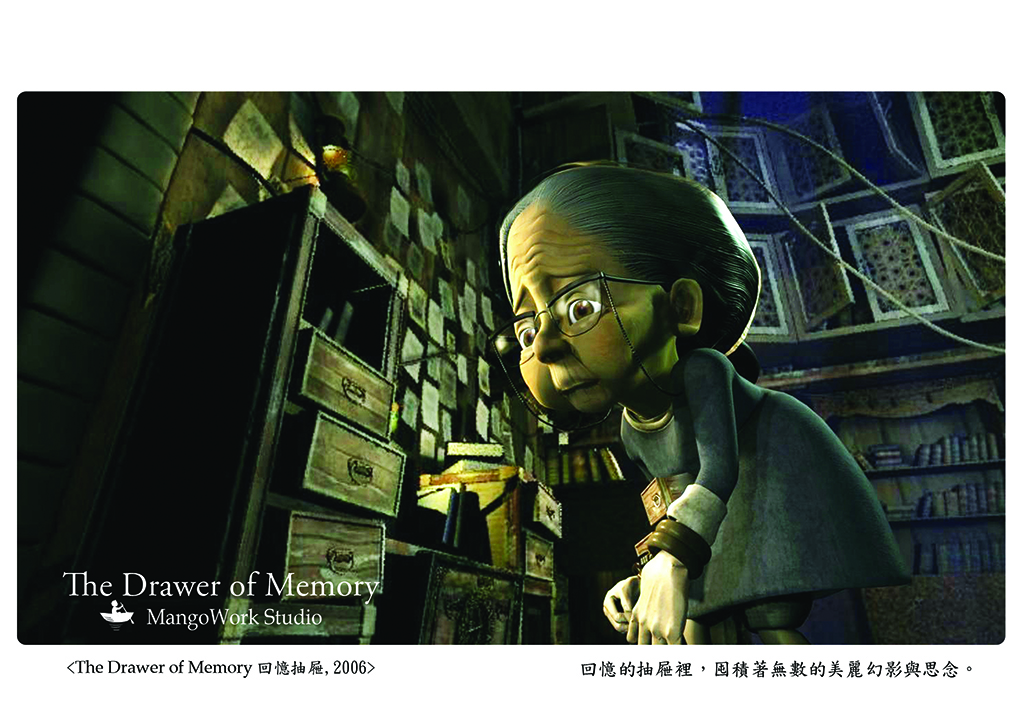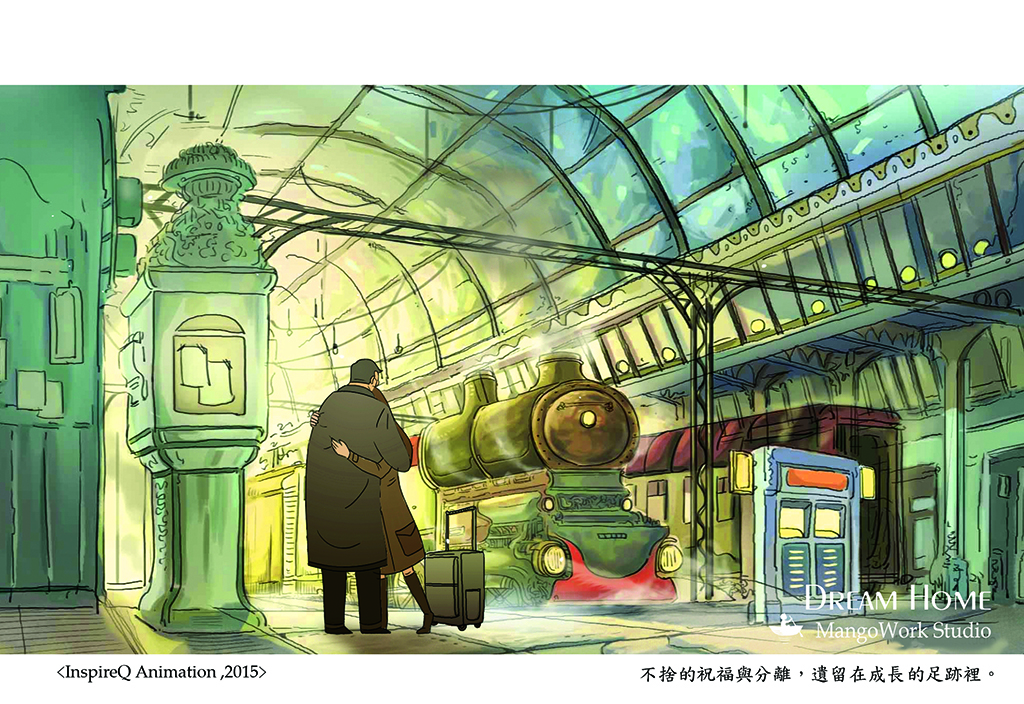導演
Director
Article of famous designers

導演
Director
Over the past few years, website platformshave been thriving, and the animated movies trend has started to skyrocket. Nomatter whether its Demon Slayer, Your Name, or classicfilms by Pixar and Disney, anime films have become more widely accepted by thegeneral market, and audience age groups are growing increasingly diverse.Additionally, young students are learning animation in droves. This was trulyunthinkable over 10 years ago. As an anecdote to the above, I often receiveletters from young people who are ardent and passionate about learninganimation. Some would like to learn in my studio, and others like to pick mybrain about film festivals and competitions. However, the most common questionsare about future employment, cross-industry changes, and studying animationabroad. “I don’t have a degree in animation, but I’d like to learn.” “I’d liketo study animation abroad. What are your suggestions?” Every time I seequestions like these, I think they’re great! Although information on theinternet is accessible, and it is easy to obtain various info, learninganimation and studying abroad are still a significant path that can changeone’s life, and at the same time, it’s a path filled with yearned-for dreamsand strict challenges. And so, as a seasoned veteran who’s studied in worldfamous schools, worked in Hollywood, and participated in many internationalfilm festivals, I’d like to share some of my viewpoints in the hopes that theycan guide young students toward their own right path.
“I don’t have a degree related to animation,but I would like to learn.” Too many people have asked me this question. Somehave a degree in design or arts and would like to change their career paths,but they don’t have any skills. Many of them have acquired skills fromunrelated departments, but they don’t have the necessary hand-painting skills.With respect to this kind of question, my first suggestion is that they do morelegwork and research into the field of animation. This sounds like a reallybasic, simple suggestion, but it’s surprising just how many young students ingeneral don’t fulfill this basic requirement. You must devote time and effortto understand and research the path you want to trek, as that’s where your futurelies. The process and know-how for producing an animation are much morespecialized and complicated than what first comes to people’s minds. It takesat least three, maybe even five years just to learn the fundamentals. When youshoot a film, you first shoot many different scenes and pick the right onesafter you’ve conceptualized the content. However, producing an animation islike building a house. You have to build a foundation all from scratch. If youwant to be a professional animation producer, you have to figure out first ifyou want to produce 2D or 3D animations. The 2D industry includes originalpainters, art, and storyboards, while the 3D industry also contains models,lighting, texture, motion, and image synthesis. Their required expertise anddetailing are completely different. It is far from being enough to just be ableto draw alone. You have to first learn the requisite skills and delve intoprofessional fields. Upon thorough scrutiny, you combine your interest withtalent before you decide the direction of animation you would like to beinvolved in. Most people from other fields underestimate this process.Actually, animation is a very complex and specialized skill. You have to learnabout it first to see if it fits you, and you have to be mentally preparedbefore taking the leap into the field


Next, afteryou’ve gotten your foot into the professional door, the next step is toaccumulate a good portfolio - a timeless, masterstroke move you’llnever regret doing. No matter whether you’re searching for jobs, applying forschools, or participating in film festivals, building a portfolio withreadily-available works is the most important thing to have. The onlydifference is that each person has their own creative directions. Based on popularquestions mentioned in the first paragraph, I summarize animation departmentsthat you can apply for in the United States. In the United States, animationschools can be roughly divided into two kinds - renowned professional schoolsand vocational schools. It is much more difficult to enter the former. To beadmitted to this kind of school, you have to show your outstanding “potential,”“creative sparks” and solid “fundamental skills.” It can be an award-winningshort film, a segment of a demo reel that shows your own style, or a themedportfolio of your drawings. For example, I was successfully admitted to manyfamous animation schools and awarded scholarships in the United States with TheDrawer of Memory, my own 3D animation work, along with my TOEFL scores.Adding onto this, it’s easier to get accepted to a vocational school. However,it’s still comparatively harder to get accepted to one in the United Statesthan getting into one in Taiwan. You have to show your talent, skills, andflare in at least one animation ability. For example, if you’re good atstorytelling, your portfolio can emphasize scripts and storylines. If you areskilled in aesthetics, you can stress background storyboard drawings,illustrated characters, and the setting of scenes. If you excel at actions, youcan strengthen your animation theories and the performances of characters inthe film. However, being unique does not mean you have to be “non-mainstream.”Instead, you have to work hard on the mainstream route, fortifying your own creativesparks. Having your own handy portfolio is the most important step. I suggestyou bring your talent into full play by honing one or two skills in particular.You don’t have to be some omnipotent deity, good at doing everything. Moreover,you get extra brownie points if your portfolio shows a clear logical flow andconsistent style.

Last but notthe least, young students have to be honest with themselves, “Why do I want togo abroad?” What is your purpose for going overseas? Is it for a diploma? Is itfor broadening your horizons? Is it to looking for a job overseas? Is it forproducing a piece of work or a particular project? For the same reason, you canchange the question to, “Why am I learning animation?” You don’t get a standardanswer by asking yourself these questions. The only purpose is to confirm yourdetermination. As long as youthoroughly examine and clarify your thoughts, have a profound conversation withyourself, and are clear about your questions and motives, you can boldly devoteyourself to pursuing your dream without turning back! No matter what yourfuture results hold, you’ll never regret your life. However, keep in mindthat you shouldn’t “go abroad just for the sake of going abroad.” Do NOT learnanimation just because many people do so. It takes great passion, perseverance,and determination to enter the animation profession so that you can stick to itfor a long time. To sum up, be involved in animation production or obtain ananimation degree is NOT something impossible to attain, but it IS important toobjectively examine your present abilities and think clearly before making upyour mind to do it. After that, you have to learn patiently and work hard, setyour goal and prepare for it with a purpose. By doing so, both students inanimation-related departments and those who’re changing their career paths can enjoythe opportunity to realize their dreams.
Although we might not rake in boatloads of cash in the animationindustry, and it’s a bittersweet slog of a job, we’re all dream chaserspassionate about animation. As long as you pick up a pen, you can be immersedin a boundless, imaginary world anytime and anywhere. As long as you pick up apen, you can be the king or queen of creation in your own world all the time.This is the most valuable pearl of wisdom I can impart. I hope young studentscan hold ontightly to this dream ofanimation and live out their own aspirations. No matter what the result is, Ibelieve you’ll never regret pursuing this dream as long as you think carefullyand do your best. At the very least, you’ll possess a different way of viewing life’s scenery and experiences with an artisticeye! Let’s encourage each other on this path of animation!
